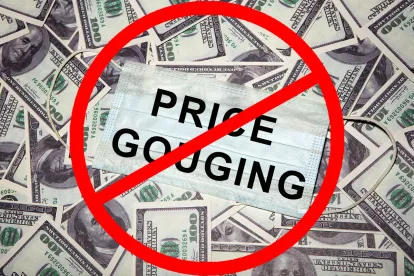In an interview on All In with Chris Hayes in January, Sen. Elizabeth Warren, D-Mass., claimed that a factor causing the high prices facing U.S. consumers is “giant corporations who say, wow, a lot of talk about high prices and inflation. This is a chance to get in there and not only pass along costs, but to inflate prices beyond that and just engage in a little straightforward price gouging.” Sen. Warren’s specific reference to price gouging could encourage a new wave of enforcement actions against larger retailers. Warren differentiates this price inflation from “companies that are passing along high prices that come from the manufacturing sector,” which she acknowledges affects “[retailers’] ability to sell goods”. Many price gouging laws allow for the passing along of increased costs.
In recent weeks, Sen. Warren has ramped up pressure on businesses she feels are contributing to high prices for consumers. According to NBC News, in a letter addressed to the heads of three supermarket chains, Sen. Warren specifically claimed that producers and grocers are exploiting the pandemic by increasing prices more than necessary to pass on increased costs to consumers. The article stated that 2020 saw supermarket sales increase by 11% from the previous year. Warren went on to write in her letter that “Your companies had a choice: They could have retained lower prices for consumers and properly protected and compensated their workers, or granted massive payouts to top executives and investors . . . It is disappointing that you chose not to put your customers and workers first.”
* * *
In the Western District of Washington, plaintiffs responded to Amazon’s pending motion to dismiss price gouging claims brought under Washington’s consumer protection law along with negligence and unjust enrichment claims. Amazon filed its motion to dismiss plaintiffs’ first amended complaint in December. Amazon argued that price increases were driven by the basic economic principles of supply and demand and that the court should not impose a blanket price ceiling of its own accord. Washington does not have a separate price gouging law but plaintiffs suggest a 15% limit would be a “conservative threshold”. Amazon stated that “Plaintiffs’ allegation that all prices above Plaintiffs’ arbitrarily imposed 15% threshold cause ‘substantial consumer injury,’ even if driven by increased costs of supply or labor or by the expiration of a short-term sale or discount, finds no support in the law or in economic principles.” Finally, Amazon argued that plaintiffs had alternatives to purchasing at the higher prices or could have utilized Amazon’s refund policy.
In their opposition, plaintiffs argue that their claims are viable under Washington’s consumer protection law because Amazon’s prices, which according to plaintiffs’ increased up to 826% for named plaintiffs, were “unfair”. Plaintiffs cite to Washington precedent to support that no additional price gouging statute is required for the court to find the pricing practices unlawful if they are “unfair”. It is up to the factfinder to determine if “an unregulated practice violates the public interest and is thus ‘unfair’”. Additionally, plaintiffs argue that Amazon’s prices could be considered “immoral, unethical, oppressive, or unscrupulous” which Washington courts have established as “unfair acts or practices”.
Plaintiffs reiterate that because of the state of emergency, they were forced to accept Amazon’s prices. They argue “the mere existence of a ‘choice’ to buy a product” does not make the injury avoidable and that the COVID-19 pandemic and lockdown orders limited consumers’ ability to pursue substitutes. Further, plaintiffs claim that Amazon’s refund policy did not authorize refunds for alleged price gouging and that the plaintiffs who sought refunds, got the “runaround” from Amazon’s customer services.
The motion is before Judge Robert S. Lasnik and oral argument was requested.





 />i
/>i

